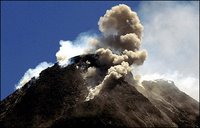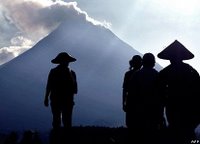Today's headline at Yahoo! reads the following:
Thousands Flee Dangerous Indonesia Volcano
By CHRIS BRUMMITT, Associated Press Writer
40 minutes ago
MOUNT MERAPI, Indonesia - Thousands of people fled the fertile slopes of Indonesia's most dangerous volcano Saturday as glowing lava oozed down the side and ash and rock spewed from the mountaintop, leading authorities to warn that an eruption could come soon.
Note the voice used to sensationalize the news here: "people fled" and "most dangerous volcano". This, of course, occurs all the time to gain readers, as news is big business. But, this particular story is of personal interest due to our proximity to the "rock spewing mountaintop".

Sid, our assistant superintendent, went to Ketep Pass between Mount Merbabu and Mount Merapi to take photos last night. The crowds of spectators were so thick that he continued another twenty kilometers to Selo, slightly closer to the "dangerous" crater. Sid did see some lava. But, as he was showing me the photos, I could make out no more than a spec of red on the screen of his professional grade digital camera. Surprised, I asked why he didn't get any better shots. "What you see here is all there was," he laughingly replied.
The smoke you can see at Yahoo! is more than usual, but Merapi constantly bellows fumes.
Google Earth, another modern technological marvel, always shows Merapi smoking. In other words, yes, it's errupting; but, no, it's not that sensational.
To regress to the title, the Indonesian version of fleeing is like golfers leaving the eighteenth hole, headed for a drink at the club house. It's more of a saunter or a meandering. To say that they "fled there homes" is about as accurate as saying that the Triumphant Entry centered around Jesus racing into Jerusalam on a steed to get good seats at the synagogue. No one flees here. Many locals think that they, or their elders, will know when the volcano is ready to release its digested rock, and that all this hype is only keeping them from tending their flocks and farms. Of course, most of them have no access to Internet, nor can they read English. Although, I bet that if they could, they'd wonder which village had inspired this article. Then they'd all sit under Merapi for morning jamu (health drinks) and gossip about their neighbor's folly before cutting more grass for their livestock.



